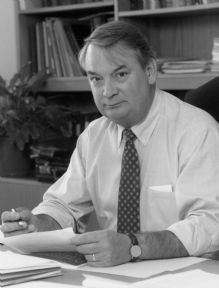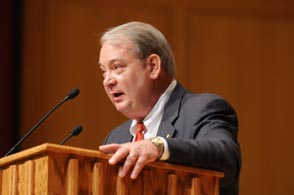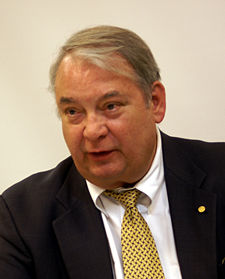Potential "Magic Bullet" Developed by Nobel Laureate Ferid Murad '58 Could Save Millions of Lives
June 20, 2008
 June 20, 2008, Greencastle, Ind. - "Forget chugging chalky Kaopectate when your next bout of diarrhea hits," begins a story in Chemical & Engineering News. "One day, a newly synthesized pyridopyrimidine derivative may be used to halt diarrhea caused by toxin-producing strains of the bacteria Escherichia coli. The novel compound, identified by pharmacologist Ferid Murad and co-workers at the University of Texas Health Science Center, prevents the heat-stable enterotoxin (STa) secreted by E. coli from stimulating the accumulation of fluids in the intestine and causing diarrhea."
June 20, 2008, Greencastle, Ind. - "Forget chugging chalky Kaopectate when your next bout of diarrhea hits," begins a story in Chemical & Engineering News. "One day, a newly synthesized pyridopyrimidine derivative may be used to halt diarrhea caused by toxin-producing strains of the bacteria Escherichia coli. The novel compound, identified by pharmacologist Ferid Murad and co-workers at the University of Texas Health Science Center, prevents the heat-stable enterotoxin (STa) secreted by E. coli from stimulating the accumulation of fluids in the intestine and causing diarrhea."
Carrie Arnold writes, "Unlike current therapies, which reduce fluids already accumulated, the pyridopyrimidine is the first compound to block the accumulation of fluids entirely."
Murad, M.D., Ph.D., a 1958 graduate of DePauw University, won the 1998 Nobel Prize in Physiology or Medicine for his work in discovering that nitric oxide functions as a signal molecule in the cardiovascular system.
The story notes, "Approximately 2 million children in developing countries die from diarrheal diseases each year, and bacteria like E. coli cause more than half of these deaths ... Current treatments for diarrhea, such as rehydration or drugs like Kaopectate, focus on suppressing the disease's symptoms. Treating bacterial diarrhea with antibiotics isn't practical, Murad says, citing difficulties in developing an appropriate drug regimen. Furthermore, antibiotics would not decrease levels of STa already present in the intestinal lumen."
Stanley G. Schultz, M.D., professor, associate dean for Institutional Advancement and Fondren Chair in Cellular Signaling at the University of Texas Medical School at Houston, declares: "These findings are a promising lead into what could prove to be a triumph of translational research of staggering importance. An inexpensive drug that could block the intestinal secretory pathway, with minimal side effects, would be a 'magic bullet' that would not only save millions of lives in many parts of the developing world, but would also save the billions of dollars that are lost annually because of diarrhea throughout the world. It would truly be a treatment of diarrhea rather than a treatment of the consequences of diarrhea."
save millions of lives in many parts of the developing world, but would also save the billions of dollars that are lost annually because of diarrhea throughout the world. It would truly be a treatment of diarrhea rather than a treatment of the consequences of diarrhea."
Dr. Murad states, "This newly discovered compound decreases the formation of ever-present cellular messenger molecules, cyclic guanosine monophosphate and cyclic adenosine monophosphate, caused by various bacterial toxins and might prevent or attenuate the intestinal fluid secretion, diarrhea and dehydration. While this research looks extremely promising as a preventive or therapeutic intervention in Third World diarrheal disease and travelers' diarrhea, much work remains to be done to move into clinical trials and eventual therapeutic approval." He adds, "I always thought we would find a compound. We now have the right set of people and right circumstances to solve this. We found this compound while screening a library of chemical substances."
Chemical & Engineering News quotes Henry J. Binder, professor of medicine at Yale University, as sating the pyridopyrimidine derivative "offers great promise" and "represents a potentially useful drug in the treatment of cyclic-nucleotide-mediated diarrhea."
Read the complete story at the magazine's Web site or in this more detailed article.
Ferid Murad delivered the golden anniversary address to his Class of 1958 at DePauw's Alumni Celebration last Saturday. A brief summary of his remarks and a link to an MP3 file of the complete speech can be found in this story.
Dr. Murad delivered an Ubben Lecture at his alma mater in 1999.
